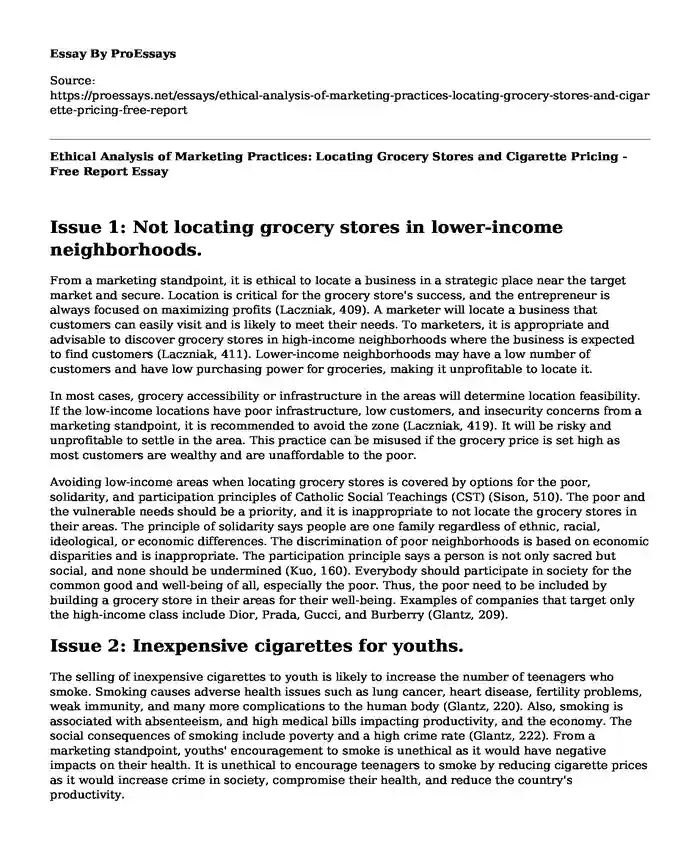Issue 1: Not locating grocery stores in lower-income neighborhoods.
From a marketing standpoint, it is ethical to locate a business in a strategic place near the target market and secure. Location is critical for the grocery store's success, and the entrepreneur is always focused on maximizing profits (Laczniak, 409). A marketer will locate a business that customers can easily visit and is likely to meet their needs. To marketers, it is appropriate and advisable to discover grocery stores in high-income neighborhoods where the business is expected to find customers (Laczniak, 411). Lower-income neighborhoods may have a low number of customers and have low purchasing power for groceries, making it unprofitable to locate it.
In most cases, grocery accessibility or infrastructure in the areas will determine location feasibility. If the low-income locations have poor infrastructure, low customers, and insecurity concerns from a marketing standpoint, it is recommended to avoid the zone (Laczniak, 419). It will be risky and unprofitable to settle in the area. This practice can be misused if the grocery price is set high as most customers are wealthy and are unaffordable to the poor.
Avoiding low-income areas when locating grocery stores is covered by options for the poor, solidarity, and participation principles of Catholic Social Teachings (CST) (Sison, 510). The poor and the vulnerable needs should be a priority, and it is inappropriate to not locate the grocery stores in their areas. The principle of solidarity says people are one family regardless of ethnic, racial, ideological, or economic differences. The discrimination of poor neighborhoods is based on economic disparities and is inappropriate. The participation principle says a person is not only sacred but social, and none should be undermined (Kuo, 160). Everybody should participate in society for the common good and well-being of all, especially the poor. Thus, the poor need to be included by building a grocery store in their areas for their well-being. Examples of companies that target only the high-income class include Dior, Prada, Gucci, and Burberry (Glantz, 209).
Issue 2: Inexpensive cigarettes for youths.
The selling of inexpensive cigarettes to youth is likely to increase the number of teenagers who smoke. Smoking causes adverse health issues such as lung cancer, heart disease, fertility problems, weak immunity, and many more complications to the human body (Glantz, 220). Also, smoking is associated with absenteeism, and high medical bills impacting productivity, and the economy. The social consequences of smoking include poverty and a high crime rate (Glantz, 222). From a marketing standpoint, youths' encouragement to smoke is unethical as it would have negative impacts on their health. It is unethical to encourage teenagers to smoke by reducing cigarette prices as it would increase crime in society, compromise their health, and reduce the country's productivity.
Promoting smoking to the youths is covered by the human person's dignity, the human family's solidarity, the common good, and the social nature of a human person's CST principles. The church proclaims the dignity of a person is the basis for developing a moral society. Health and life are sacred; thus, lowering cigarette prices for the youth is against the principle. Cigarettes cause diseases that can lead to the deaths of the youths. The human family principle's solidarity encourages people to love one another and wish the best for each other (Kuo, 166). Smoking to the youths will harm them, while the marketers will earn huge profits, which is injustice and unethical. Also, everything should be done for each person's common good, which is the opposite of reducing prices for cigarettes. The social nature principle teaches the importance of peace in society, which is compromised by smoking as it would increase violence among families. Examples of cigarette brands that target young people are Marlboro, Newport, and Camel (Glantz, 228).
Work Cited
Glantz, Stanton A., and David W. Bareham. "E-cigarettes: use, effects on smoking, risks, and policy implications." Annual review of public health 39 (2018): 215-235. https://www.annualreviews.org/doi/abs/10.1146/annurev-publhealth-040617-013757
Kuo, Wen-ban. "The implementation of Catholic social teaching in Taiwan." The Catholic Church in Taiwan. Palgrave Macmillan, Singapore, 2018. 151-174. https://link.springer.com/chapter/10.1007/978-981-10-6668-9_8
Laczniak, Gene R., and Patrick E. Murphy. "The role of normative marketing ethics." Journal of Business Research 95 (2019): 401-407. https://www.sciencedirect.com/science/article/abs/pii/S0148296318303552
Sison, Alejo José G., Ignacio Ferrero, and Gregorio Guitián. "Human dignity and the dignity of work: Insights from Catholic social teaching." Business Ethics Quarterly 26.4 (2016): 503-528. https://www.cambridge.org/core/journals/business-ethics-quarterly
Cite this page
Ethical Analysis of Marketing Practices: Locating Grocery Stores and Cigarette Pricing - Free Report. (2023, Dec 15). Retrieved from https://proessays.net/essays/ethical-analysis-of-marketing-practices-locating-grocery-stores-and-cigarette-pricing-free-report
If you are the original author of this essay and no longer wish to have it published on the ProEssays website, please click below to request its removal:
- Moral Consistency Essay
- Ethics in Social Work Essay Example
- Globalization on the Ultimate Fighting Championship (UFC) Paper Example
- Essay Example on Funding for HSC: Reduce Cancellations to 92% Completion Ratio
- Facebook-Cambridge Analytica: The Data Scandal That Shook the World - Essay Sample
- Essay Example on Developing a Diversity Training Plan: Strategies and Implementation
- Free Essay Example on Code of Ethics in Texas







